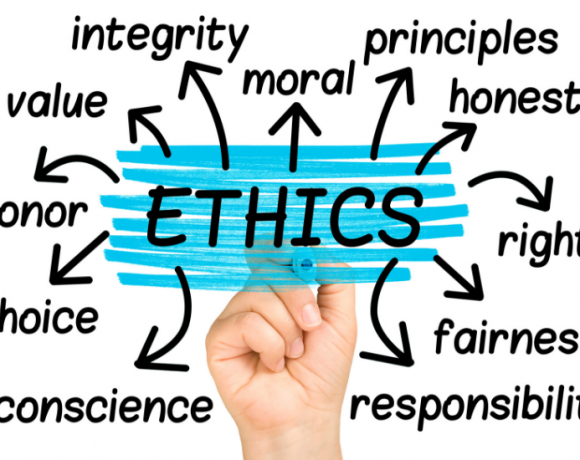“Ethics” and proving “Ethical Credentials” have become new buzz words in almost all spheres of life including medical practice, medical research, all the way through to business Ethics and commercial “Ethical” investments. In this short series, we explore some key principles and ideas associated with proving one’s own Ethical Credentials.
What?
“Ethics” is one of those topics for which one can
write pages upon pages without actually defining it. How does one then take a
matter that cannot be properly defined and actually wear an ethical credential?
In fact, one could argue that, just by being and living, we all live by certain
ethical rules and principles whether this is consciously or unconsciously known
to us or not.
We can start at the very beginning. Creation and Human
Birth itself, being the miraculous event that it is, involves a keen
demonstration of Ethics. The one sperm (amongst millions) that gets an
opportunity to fertilise the ovum is usually the healthiest and most able
candidate. Have all the other sperms of lesser (perhaps only slightly lesser)
ability been a wasted resource? Is it ethical that all these sperms have been
produced and they have had almost no chance of fulfilling their mission at the
time of their creation? Science tells us that this mechanism is just nature’s
way of maximising the chances of human fertilisation. So, this tells us that it
must be natural and ethical that some amount of wasteful redundancy is built in
to this activity and almost all further activities involving human interaction.
The unselfish mother has to endure months of hardships
to ensure the delivery into the world of a new human being. The baby somehow
knows that its main job is to eat and grow, babies know when to smile to get
appreciation and know when to cry and get attention. The weighing up of choices
of daily living continues in the background, while the ultimate priority of
child birth and growth is happening regardless of the fine details of those
choices. One could therefore postulate that every mother and baby is inherently
“Ethical” due to the very fact of their existence.
Every individual also has to have a certain amount of
ethical credentials to interact with society. Growing up in a caring
environment implies adherence to and incorporation of certain ethical
principles (ensuring everyone has enough food, equitable distribution of toys,
respect for elders who may visit the family home….). Regular attendance at
school enables a disciplined approach to learning and interactions with friends
and teachers, this also enables further refinement of ethics. Higher education
provides an opportunity to further improve upon basic skills, some of these may
relate to highly technical aspects of the course subject, but again, there is
frequently an emphasis on asking questions and seeking solutions, which also
involves a certain discrimination and possibly involves comparison with
established convention which is all likely based on a platform of good ethical
practice.
The scenario of finding a mate and starting a family
may not present itself as an obvious candidate involving ethical scrutiny, but
one could argue that this is happening at a subconscious level, and although
mates may have been chosen on their appearance, achievements, ambitions,
potential to improve standard of life and so on, all of these are usually based
on a platform of ethical principles at their core. While one may not have
ethics on a checklist, while choosing a mate, this is frequently implied and
assumed.
Our index candidate has now completed higher studies,
settled down with a mate and is now faced with a growing burden at home and work.
Newly appointed freshers in the job may do the same job much faster and it may
be time to take on senior roles in the organisation to guide these youngsters,
climb the career ladder as well as earn some more money to feed the family. The
most frequently used tool to decide on career progression involves some element
of performance review. Again, ethics and adherence to ethical principles or
wearing ethical credentials may not figure prominently (if at all) on such a
checklist, but these principles frequently underpin successful appraisals at
performance review.
Our middle-aged person again demonstrates adherence to
ethical principles when planning for retirement, ensuring that children are
given a helping hand while navigating their own challenges. How does planning
for one’s own family demonstrate good ethical practice and not be seen as an
act of profound selfishness, whereby the growth and well-being of one’s own
family is prioritised over the needs of others? Some famous billionaires have
chosen to counter this perception by choosing to donate some or most of their
fortune to charity rather than pass it on wholly to their own family. Most
individuals (especially non billionaires) do not make such announcements and it
is entirely seen as a matter of personal choice and an invasion of privacy, if
there is an expectation of announcements of significant donations to charity to
enable an “ethical credential”.
Every being that is born has to die, so is there a
demonstration of ethics in death? Clearly, if one has a choice in their own
death, they would ensure minimal inconvenience to near and dear ones, while
trying to maximise benefit to their family, and inheritance tax planning is
usually based on minimising tax payments to the state. So, someone who has not
conducted adequate inheritance tax planning may inadvertently hand more
resource to the state. How can a philosophy based on minimising payments to the
state be based on good ethical principles?
So, most humans who conform to standard expectations
from society have actually demonstrated some conscious or unconscious awareness
of ethics and ethical principles. Does this mean that someone who has not grown
up in a caring environment, not undergone formal education, not taken the
expected route to family life and job is “ethically” inferior to others who fit
more traditional roles? Of course not, we would never label anyone who may be
deemed non-conformist by some sections of society as “unethical”. Human Life is
too precious and too unpredictable for restrictions to be placed from an ethics
perspective. It is of course perfectly possible to breeze through life without
appearing “ethical” or demonstrating adherence to “ethical principles”.
So the answer to “what is an ethical credential” is
still unanswered in full and perhaps the other questions may give us a clue.
This brings us on to “Why”.
To be continued…..
Sobhan Vinjamuri (Key leader with wide experience of Quality Improvement; Regulation; Peer Review; Internal and External Accreditation; Disciplinary Panels; Research, Peer Review of Research, Editorial scrutiny, Comprehensive and Confidential Service Reviews)
Photo Courtesy: Google/ images are subject to copyright


